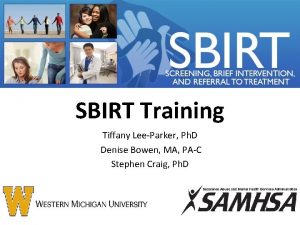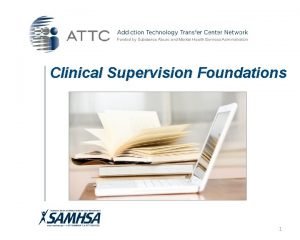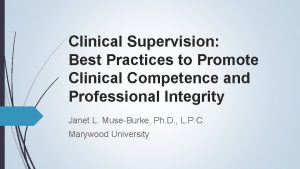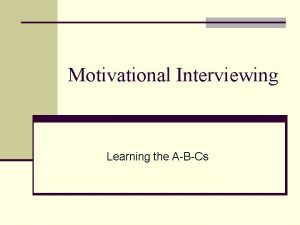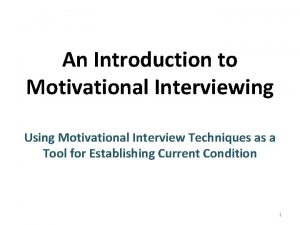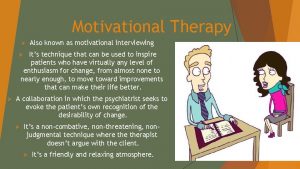MOTIVATIONAL INTERVIEWING in CLINICAL SUPERVISION Ann D Carden


































- Slides: 34

MOTIVATIONAL INTERVIEWING in CLINICAL SUPERVISION Ann D. Carden, Ph. D. Carden. Ann@aol. com © Ann D. Carden, Ph. D. - 2006 1

Motivational Interviewing: Preparing People for Change (second edition) William R. Miller & Stephen Rollnick 2002 Guilford Press www. guilford. com ……………. www. motivationalinterview. org © Ann D. Carden, Ph. D. - 2006 2

Three Kinds of Change Developmental Coerced Intentional © Ann D. Carden, Ph. D. - 2006 3

Motivational Interviewing is … Focused on § § § Intentional change and non-change processes Their natural course Ways to empower a person to choose to engage in an intentional change process © Ann D. Carden, Ph. D. - 2006 4

Motivational Interviewing Ø an integrative philosophy Ø a way of being with a person Ø a method of communication -------------… that creates and guides strategies and techniques © Ann D. Carden, Ph. D. - 2006 5

Clinical Supervision A form of mentoring in which one person draws on her personal power (knowledge, skills, experience, influence) to assist another person to: § recognize his personal power and potential apply it in his clinical work continually improve and refine that power § For the benefit of the consumer § § © Ann D. Carden, Ph. D. - 2006 6

“It is in the shelter of each other that the people live. ” Irish Proverb © Ann D. Carden, Ph. D. - 2006 7

Self-Reflection Describe a negative supervisory relationship you have experienced at some point your career. What characteristics/ behaviors of that particular supervisor were most harmful to you in your personal/ professional growth? © Ann D. Carden, Ph. D. - 2006 8

Self-Reflection Describe a positive supervisory relationship you have experienced at some point your career. What characteristics/ behaviors of that particular supervisor were most helpful to you in your personal/ professional growth? © Ann D. Carden, Ph. D. - 2006 9

Self-Reflection List what you believe to be the most important attributes of an effective supervisor. Rate yourself as a supervisor on each attribute on a scale of 1(not there yet) to 10 (absolutely there). © Ann D. Carden, Ph. D. - 2006 10

You’re on the right track when… You employ a full range of supervisory methods Case review and analysis Skill rehearsal and role play Co-facilitation Direct observation Indirect observation Skill assessment and structured feedback © Ann D. Carden, Ph. D. - 2006 11

You’re on the right track when… Your supervisee is actively involved in setting the agenda and reviewing his/her clinical material Your supervisee is evaluating his/her work and making the arguments for any needed changes There is less resistance behavior and more problem-solving behavior in your interactions Your supervisee is actively seeking your feedback © Ann D. Carden, Ph. D. - 2006 12

Motivational Interviewing “Spirit” § Autonomy vs. Authority § Collaboration vs. Confrontation § Evocation vs. Education § § and Exploration and Explanation (a COMPETENCE vs. a DEFICIT view of persons) © Ann D. Carden, Ph. D. - 2006 13

Reflective Listening The “heart” of the MI approach Simple but not easy Non-verbal as well as verbal Affirms & validates the client/supervisee Allows for the revelation of information that might otherwise be overlooked Encourages ownership and creative priority setting and problem solving by the client/supervisee © Ann D. Carden, Ph. D. - 2006 14

MI Guidelines for Feedback of Fact § Elicit person’s readiness, interest, current understanding § Provide information in a non-judgmental, non-interpretive manner § Elicit person’s interpretation of information provided © Ann D. Carden, Ph. D. - 2006 15

Six Supervisor Guidelines 1. Adhere to the MI Guiding Principles 2. Avoid Traps / Roadblocks to progress 3. Teach / model the Philosophical Foundations of MI 4. Maintain a clinical focus 5. Adapt to the Supervisee’s context 6. Assist supervisees to become proficient in MI clinical skills © Ann D. Carden, Ph. D. - 2006 16

Six Supervisor Guidelines 1. Adhere to the MI Guiding Principles 2. Avoid Traps / Roadblocks to progress 3. Teach / model the Philosophical Foundations of MI 4. Maintain a clinical focus 5. Adapt to the Supervisee’s context 6. Assist supervisees to become proficient in MI clinical skills © Ann D. Carden, Ph. D. - 2006 17

Research suggests that … The Four MI Guiding Principles create consonance/harmony in therapeutic / supervisory relationship and support the client’s / supervisee’s progression toward motivation to change and grow. © Ann D. Carden, Ph. D. - 2006 18

Guiding Principle #1 Express Empathy Ø Radical acceptance of the other person Ø Skillful and respectful reflective listening Ø Curious attitude and sincere interest in the other person’s perspective © Ann D. Carden, Ph. D. - 2006 19

Guiding Principle #2 Develop Discrepancy Ø Ø Ø Explore her professional values and goals Heighten awareness of consequences of his present approach with clients Amplify any gaps between her professional values and goals and her present actions © Ann D. Carden, Ph. D. - 2006 20

Guiding Principle #3 Roll with Resistance Ø Go with your supervisee’s energy Ø Shift focus as needed Ø Avoid judgment © Ann D. Carden, Ph. D. - 2006 21

Guiding Principle #4 Support Self-efficacy Ø Believe in the possibility / carry the hope Ø Honor his organismic wisdom Ø Affirm any progress toward her goal © Ann D. Carden, Ph. D. - 2006 22

Six Supervisor Guidelines 1. Adhere to the MI Guiding Principles 2. Avoid Traps / Roadblocks to progress 3. Teach / model the Philosophical Foundations of MI 4. Maintain a clinical focus 5. Adapt to the Supervisee’s context 6. Assist supervisees to become proficient in MI clinical skills © Ann D. Carden, Ph. D. - 2006 23

Research suggests that … Six MI Traps/Roadblocks create dissonance in therapeutic / supervisory relationship, block the client’s / supervisee’s progress and may even cause regression away from motivation to change and grow. (Even within the same session) © Ann D. Carden, Ph. D. - 2006 24

Common Trap #1 q Closed Question trap … - blocks exploration - distances © Ann D. Carden, Ph. D. - 2006 25

Common Trap #2 q Arguing for change trap … - evokes opposition - creates an unsafe environment - encourages shame © Ann D. Carden, Ph. D. - 2006 26

Common Trap #3 q Expert trap … - invites dependency - discourages creative problemsolving - deflates self-confidence © Ann D. Carden, Ph. D. - 2006 27

Common Trap #4 q Labeling trap … - depersonalizes - demoralizes - disempowers © Ann D. Carden, Ph. D. - 2006 28

Common Trap #5 q Premature focus trap … - inhibits exploration - prevents “unpacking” of meaning - weakens the relationship © Ann D. Carden, Ph. D. - 2006 29

Common Trap #6 q Blaming trap … - damages self-esteem - evokes defensiveness © Ann D. Carden, Ph. D. - 2006 30

Six Supervisor Guidelines 1. Adhere to the MI Guiding Principles 2. Avoid Traps / Roadblocks to progress 3. Teach / model the Philosophical Foundations of MI 4. Maintain a clinical focus 5. Adapt to the Supervisee’s context 6. Assist supervisees to become proficient in MI clinical skills © Ann D. Carden, Ph. D. - 2006 31

Motivational Interviewing is … related to: o Client-Centered Therapy o Self-Regulation Theory o Trans-Theoretical Stages of Change Model o Self-Perception Theory © Ann D. Carden, Ph. D. - 2006 32

Client-Centered Therapy Model © Ann D. Carden, Ph. D. - 2006 33

“Non-specific Factors” n Empathy n Unconditional Positive Regard n Genuineness © Ann D. Carden, Ph. D. - 2006 34
 Decisional balance
Decisional balance Motivational interviewing
Motivational interviewing Motivational interviewing schizophrenia
Motivational interviewing schizophrenia Dares motivational interviewing
Dares motivational interviewing Darn cats motivational interviewing
Darn cats motivational interviewing Motivational interviewing wiki
Motivational interviewing wiki Nimi singh
Nimi singh Agreement with a twist motivational interviewing
Agreement with a twist motivational interviewing Rolling with resistance definition
Rolling with resistance definition Amplified reflection example
Amplified reflection example Motivational interviewing basics
Motivational interviewing basics Darn cat motivational interviewing
Darn cat motivational interviewing Active listening motivational interviewing
Active listening motivational interviewing Motivational interviewing case management
Motivational interviewing case management Sbirt faith and spirituality
Sbirt faith and spirituality Contoh motivational interviewing
Contoh motivational interviewing Mi readiness ruler
Mi readiness ruler Motivational interviewing dears
Motivational interviewing dears Change talk worksheet
Change talk worksheet Darn cat motivational interviewing
Darn cat motivational interviewing Motivational interviewing
Motivational interviewing Darn cat motivational interviewing
Darn cat motivational interviewing Motivational interviewing dears
Motivational interviewing dears Motivational interviewing
Motivational interviewing Desire ability reason need
Desire ability reason need Motivational interviewing traps
Motivational interviewing traps Motivational interviewing
Motivational interviewing Clinical supervision foundations ii
Clinical supervision foundations ii Goals of clinical supervision
Goals of clinical supervision Stages of clinical supervision
Stages of clinical supervision Clinical supervision questions
Clinical supervision questions Best practices in clinical supervision
Best practices in clinical supervision Was sally ann thunder ann whirlwind a real person
Was sally ann thunder ann whirlwind a real person Second best bed poem
Second best bed poem Performance based interviewing
Performance based interviewing





















